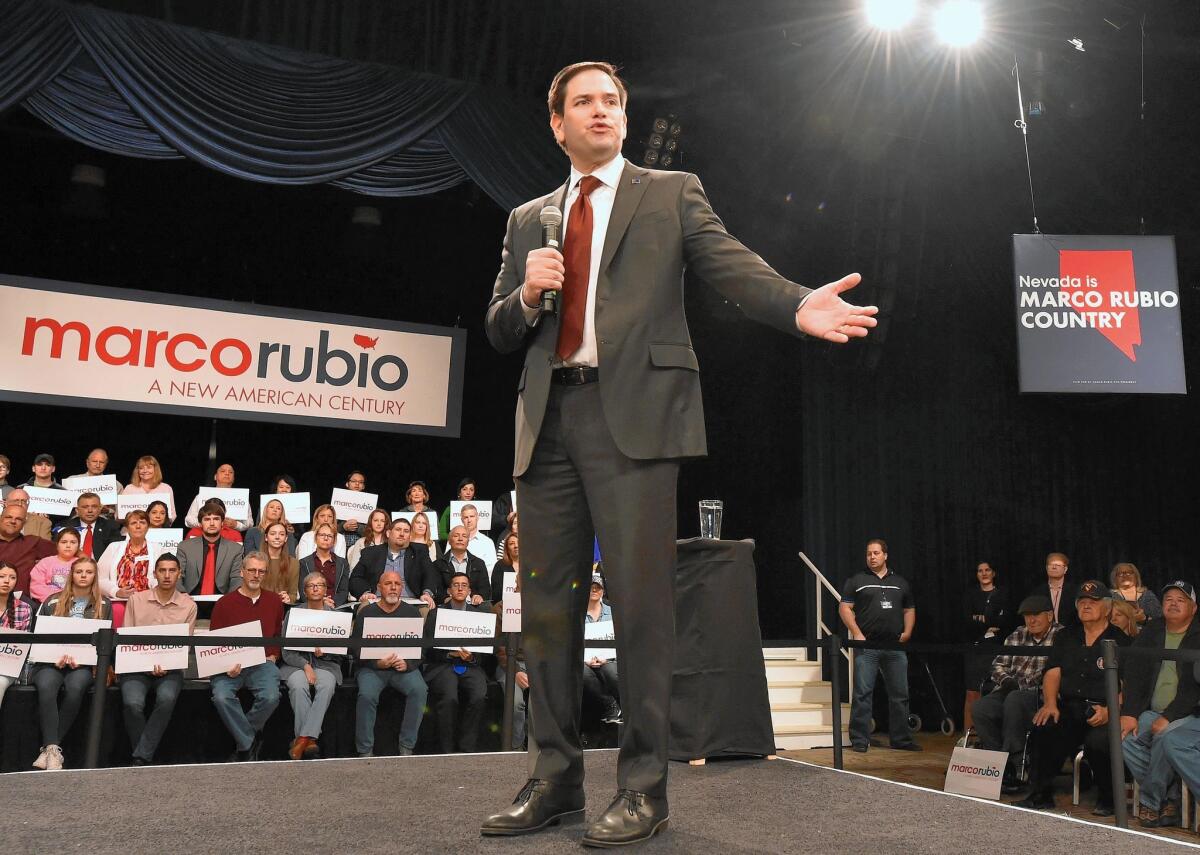Marco Rubio’s test: Florida senator backs down from threat to defy Trump over secretary of State pick

- Share via
Reporting from Washington — During his rapid rise, Sen. Marco Rubio has been described in many ways — charismatic, smart and a young political leader in a hurry.
But in a defining moment Monday, with his decision to fall in line with President Trump’s pick for secretary of State, Rubio risks a less flattering label: someone who folds under pressure.
The Florida senator was the last remaining Republican holdout against Rex Tillerson, the ExxonMobil executive whose relationship with Russia has drawn widespread scrutiny. Rubio once balked that a “friend” of Russian President Vladimir Putin was not what he wanted in the top U.S. diplomat.
But facing pressure not to stall Trump’s choice, and as other Tillerson critics — Sen. John McCain (R-Ariz.) and Sen. Lindsey Graham (R-S.C.) — dropped their opposition, Rubio backed down.
“I believe the president is entitled to significant deference when it comes to his choices for the Cabinet,” Rubio said in a lengthy statement Monday.
He remained critical of Tillerson, calling his views on many issues “troubling.” He also criticized Tillerson’s unwillingness to acknowledge Putin’s alleged war crimes.
“Despite his extensive experience in Russia and his personal relationship with many of its leaders, he claimed he did not have sufficient information to determine whether Putin and his cronies were responsible for ordering the murder of countless dissidents, journalists and political opponents,” Rubio said of Tillerson.
At the same time, Rubio sized up the politics and assessed correctly that his opposition was a losing battle. It would stall but not stop Tillerson’s nomination. He would be wasting political capital.
Tillerson is now expected to sail to confirmation. He passed the first hurdle Monday, when senators on the Foreign Relations Committee voted 11-10 to send his nomination to the full Senate.
No Republicans now oppose Tillerson, and Democrats as the minority party do not have enough votes to stop his confirmation.
Trump made promises to blue-collar voters. Democrats plan to make sure he follows through »
Democrats blasted Rubio for failing to stick to his initial skepticism of Trump’s pick.
“By ignoring his serious reservations about Tillerson’s connections to Vladimir Putin, Marco Rubio is not only rolling over for Donald Trump, he’s earning the nickname Trump gave him: ‘Little Marco,’” said Zac Petkanas, senior advisor at the Democratic National Committee.
Defying Trump would have been risky for Rubio, but it also could have been politically beneficial.
Rubio’s profile is poised to rise in the Trump era as a new-generation leader of a Republican Party that remains deeply divided over the president.
For many anti-Trump Republicans, the senator’s failed 2016 presidential bid stands as a stark reminder of what could have been had Trump not swept the nomination.
His vote on Tillerson was additionally fraught because part of Rubio’s political appeal lies in his growing expertise in foreign affairs and national security. He has positioned himself as a counter to Trump’s untested “America first” policy.
Standing alone, though, would have come at a cost. Trump has shown he does not welcome detractors and, in fact, holds grudges against them. Prominent Republicans have reportedly been hammering Rubio with the hard sell.
Last week, Vice President Mike Pence and White House Chief of Staff Reince Priebus brought Tillerson to meet with Rubio for a 90-minute session as Trump’s team made the case not to delay Tillerson’s confirmation, according to those familiar with the session. Rubio’s opposition could have stalled Tillerson in the committee.
Rubio emerged more comfortable after the meeting. Tillerson also provided written answers to about 100 questions from the senator.
Yet as late as Sunday, Rubio “was legitimately torn,” said Alex Conant, a longtime Rubio advisor.
It’s not the first time Rubio has showed an independent streak, only to back off when the politics heated up.
Trump and the GOP are charging forward with Obamacare repeal, but few are eager to follow »
During his first term in the Senate, Rubio was a leader of the so-called Gang of Eight, who crafted a landmark immigration overhaul that was approved by a robust bipartisan majority in the Senate.
But as the bill ran into steep resistance, Rubio disassociated himself from the effort. House Republicans refused to consider the measure, and momentum for its passage faded.
On the presidential campaign trail, Rubio tried a mix of strategies after Trump started name-calling him as “Little Marco,” including counter-attacks on Trump’s “spray tan” and “small hands.” Those backfired, and once Trump became the nominee, Rubio supported him.
After his failed presidential bid, Rubio was strongly encouraged to seek reelection to the Senate if he ever hoped to run for president again — even though he had already announced he was leaving Congress. GOP leaders at the time were worried his Florida seat could fall to Democrats if he retired.
Rubio jumped into the Senate race, and in November won a second term.
ALSO
Despite talk of GOP unity, Trump’s programs face fight from Republican budget hawks
‘Believe me’: People say Trump’s language is affecting political discourse ‘bigly’
Trump’s rise draws white supremacists into political mainstream: ‘I am winning,’ says David Duke
More to Read
Get the L.A. Times Politics newsletter
Deeply reported insights into legislation, politics and policy from Sacramento, Washington and beyond. In your inbox twice per week.
You may occasionally receive promotional content from the Los Angeles Times.











